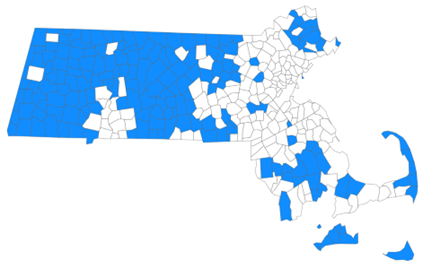Author: Chris Wilcock - Bureau Chief of Local Assessment
Massachusetts Rural assessing offices face many unique challenges such as staffing shortages, limited office hours, and budgetary constraints which can lead to untimely or incorrect assessments. Based on the definition adopted by the Rural Policy Advisory Commission (RPAC), of the 351 municipalities in Massachusetts, over half of are defined as rural, 51% or 181 communities to be exact. Since local property tax revenue is the leading revenue source in rural communities, underperforming assessing offices can put a tremendous strain on local officials and local budgets. Assessors are tasked with classifying all taxable property and ensuring fair and equitable assessment for all taxpayers annually. Each community must hire or contract with assessing professionals to handle administrative duties, inspect properties annually, calculate new growth, and generate annual assessed values for the municipality. The Board of Assessors ensures that all property, real and personal, situated within their jurisdiction, unless expressly exempt, shall be subject to taxation every year. MGL Chapter59 Section2 Since the road to learn assessing has a steep learning curve and typically requires many years of specialized training to reach proficiency, it might be unreasonable to expect that rural communities can keep up with larger communities or receive support locally.
In January, the Bureau of Local Assessment (BLA) successfully created a new position solely to address the growing needs of rural assessing offices. The Rural Community Outreach Program Manager at DLS will work with rural assessors to provide additional support and resources to rural assessors. How do you classify a rural community in Massachusetts? In 2015, the Massachusetts Legislature created the RPAC because of the need for cooperative intervention on behalf of rural communities in the state. RPAC defined a rural community by using population density and any Massachusetts community with a population density of less than 500 people per square mile is defined as rural. Since the list of rural communities stretches from Nantucket to Hancock, BLA will have the important task of tiering those 181 communities on a needs basis to serve all rural communities in an equitable fashion rather than focusing on population density alone.
BLA has named Lauren Aldrich as the new project manager for rural communities. Lauren has over a decade of experience with local assessment and served as a rural community assessor before coming to the Division of Local Services (DLS). Over the last six years Lauren has worked with 30 communities in the western part of the state and has provided excellent guidance for those communities. Lauren will be reaching out to rural communities to understand common pain points and better understand the support that is needed.
How can rural municipalities improve assessing operations or combine positions with surrounding jurisdictions? Currently communities can enter into an Assessment Intermunicipal Agreement to share assessing personnel as defined in MGL c. 41 s. 30B This statute allows 2 or more municipalities to combine an pursuant to an agreement. A potential new option was included in the Municipal Empowerment Act, which was filed in January of 2024. Specifically, it includes a section to allow the creation of Regional Boards of Assessors to help streamline duties and reduce significant staffing challenges cited by many local leaders, particularly those in rural communities. If the provision were to become law, Regionalized Boards of Assessors would have the ability to create shared service agreements for Assessing staff, pool money to purchase trade software, hire property inspectional services, and complete statutory functions amongst neighboring communities.
In the coming months, as part of an effort to create training and outreach services for rural communities, the Rural Community Outreach Program Manager will develop questionnaires to help define what the specific needs within those communities are. The information gathered from these questionnaires will help determine what types of trainings will be most helpful/necessary and what resources communities may be lacking. It is of the upmost importance that this be a concerted effort between the DLS/BLA and the rural communities to ensure that the information gathered best serves the communities the program was developed to assist, further ensuring that policies and procedures followed across the Commonwealth are cohesive and in compliance with our Massachusetts General Laws.
Helpful Resources
City & Town is brought to you by:
Editor: Dan Bertrand
Editorial Board: Marcia Bohinc, Linda Bradley, Sean Cronin, Emily Izzo and Tony Rassias
| Date published: | September 5, 2024 |
|---|
